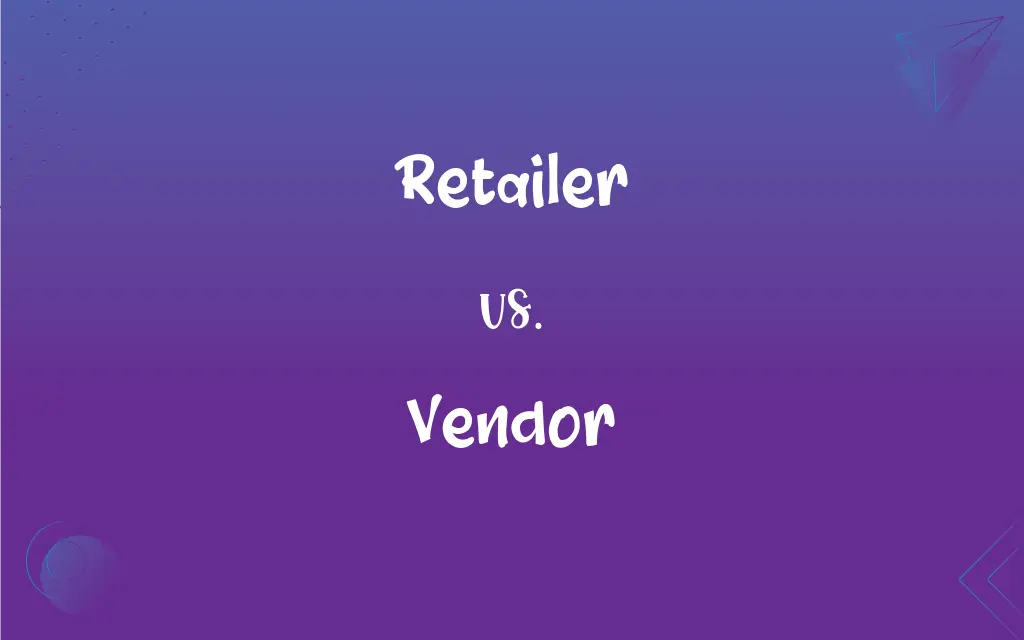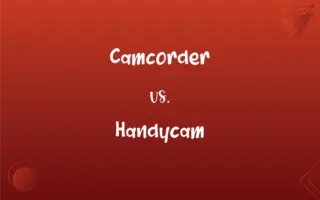Retailer vs. Vendor: What's the Difference?
Edited by Aimie Carlson || By Janet White || Published on December 4, 2023
Retailer refers to a business that sells goods directly to consumers. Vendor refers to a company or individual that sells products or services, often to retailers.

Key Differences
Retailers focus on selling goods and services directly to the end consumers, often in smaller quantities. They are the final step in the supply chain before a product reaches the customer. Vendors, on the other hand, may supply products or services to various types of clients, including retailers, other businesses, or directly to consumers, often in larger quantities or bulk.
Retailers are known for their role in presenting products to consumers, often using marketing strategies to appeal to end-users. They provide a consumer-facing interface, which includes customer service, product displays, and retail environments. Vendors are more involved in the production, wholesale, or distribution aspect and might not interact directly with the end consumer.
The business model of a retailer often includes maintaining inventory, managing a storefront (physical or online), and creating a shopping experience. Vendors are typically more concerned with manufacturing, sourcing, or wholesaling products, focusing on B2B (business-to-business) transactions.
In terms of scale and operation, retailers may range from small, local stores to large international chains, emphasizing direct sales to customers. Vendors can range from independent craftsmen to large multinational corporations, emphasizing production capacity, and wholesale relationships.
Retailers generally have direct interactions with customers, handling customer feedback, returns, and after-sales service. Vendors usually deal with bulk transactions and may not handle individual customer queries unless they also operate in the retail sector.
ADVERTISEMENT
Comparison Chart
Primary Role
Sells directly to consumers
Sells goods or services to various clients
Interaction
Direct interaction with end consumers
May not interact directly with end consumers
Business Focus
Retailing products in smaller quantities
Supplying or producing products, often in bulk
Sales Environment
Physical or online storefronts
B2B markets, manufacturing, or wholesaling
Consumer Relationship
Manages customer service and experience
Primarily handles bulk transactions
ADVERTISEMENT
Retailer and Vendor Definitions
Retailer
An intermediary in the supply chain that makes products available to the public.
As a leading retailer, they pride themselves on customer satisfaction.
Vendor
An entity that sells goods or services, often in a B2B setting.
The vendor supplied the restaurant with fresh produce daily.
Retailer
A commercial establishment offering items for sale to customers.
The local retailer had a loyal customer base due to its unique offerings.
Vendor
A company or individual offering goods for sale, particularly in bulk.
The hardware vendor offered competitive prices to construction companies.
Retailer
A business specializing in the sale of specific types of goods.
The retailer became well-known for its extensive collection of rare books.
Vendor
A seller in various marketplaces, including online platforms.
The vendor's online store featured a wide array of handmade crafts.
Retailer
A business entity that sells goods to individual consumers.
The retailer offered a wide range of electronics at competitive prices.
Vendor
A supplier of products to other businesses or directly to consumers.
The local vendor was popular among event planners for its reliable service.
Retailer
A seller operating a store or online platform for direct consumer sales.
The online retailer quickly shipped orders directly to customers' homes.
Vendor
A provider of specific services or products to a targeted market.
As a technology vendor, the company focused on innovative software solutions.
Retailer
The sale of goods or commodities in small quantities directly to consumers.
Vendor
One that sells or vends something
A street vendor.
A vendor of software products on the Web.
Retailer
Of, relating to, or engaged in the sale of goods or commodities at retail.
Vendor
One that provides products or services to a business for a fee.
Retailer
In retail quantities.
Retailer
At a retail price.
Retailer
To sell in small quantities directly to consumers.
Retailer
(also rĭ-tāl) To tell or repeat (gossip or stories, for example) to others.
Retailer
To sell at retail.
Retailer
A retail sales company or salesman.
Retailer
One who retails anything; as, a retailer of merchandise; a retailer of gossip; - used also of businesses, including large corporations; as, Sears, Roebuck is one the the country's largest retailers.
Retailer
A merchant who sells goods at retail
FAQs
Can a vendor be a retailer?
Yes, a vendor can also function as a retailer if they sell directly to consumers.
Do vendors sell to end consumers?
While vendors primarily sell to businesses, they can also sell directly to consumers.
What’s the main focus of a retailer?
The main focus is retailing products in consumer-friendly quantities and providing customer service.
What defines a retailer?
A retailer is a business that sells goods or services directly to end consumers.
Is a retailer involved in product manufacturing?
Retailers typically do not manufacture products; they source them from vendors or manufacturers.
What is a key characteristic of a retailer?
A key characteristic is the direct sale and interaction with individual customers.
Are vendors responsible for customer service?
Vendors are generally not involved in direct customer service like retailers, unless selling directly to consumers.
Can a vendor operate online?
Yes, vendors can operate in various marketplaces, including online platforms.
Is a vendor's client always a retailer?
No, vendors can sell to various clients, not just retailers.
How do vendors impact the supply chain?
Vendors supply products to different stages of the supply chain, including retailers.
Can retailers be vendors?
Retailers can act as vendors if they supply products to other businesses.
What differentiates a retailer's inventory from a vendor's?
Retailers maintain a consumer-focused inventory, while vendors may have a broader, more bulk-oriented stock.
What’s a common example of a vendor?
A common example is a wholesale supplier providing goods to retail stores.
Do retailers buy products in bulk?
Retailers often buy products in bulk from vendors or wholesalers to sell in smaller quantities.
Do vendors engage in marketing to consumers?
Vendors may engage in marketing, especially if they sell directly to consumers or wish to build brand recognition.
Is online retailing different from traditional retailing?
Online retailing differs mainly in the platform used but shares the same principles of direct consumer sales.
Can a single entity be both a retailer and a vendor?
Yes, a single entity can function as both, depending on their business model and market.
How do retailers cater to consumer needs?
Retailers cater to consumer needs through customer service, product variety, and creating a shopping experience.
What type of sales do vendors typically engage in?
Vendors typically engage in B2B sales, although direct-to-consumer sales are also possible.
What role do retailers play in the supply chain?
Retailers are the final step in the supply chain, delivering products to consumers.
About Author
Written by
Janet WhiteJanet White has been an esteemed writer and blogger for Difference Wiki. Holding a Master's degree in Science and Medical Journalism from the prestigious Boston University, she has consistently demonstrated her expertise and passion for her field. When she's not immersed in her work, Janet relishes her time exercising, delving into a good book, and cherishing moments with friends and family.
Edited by
Aimie CarlsonAimie Carlson, holding a master's degree in English literature, is a fervent English language enthusiast. She lends her writing talents to Difference Wiki, a prominent website that specializes in comparisons, offering readers insightful analyses that both captivate and inform.






































































